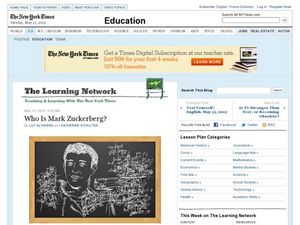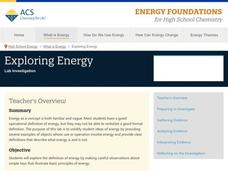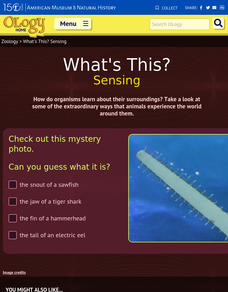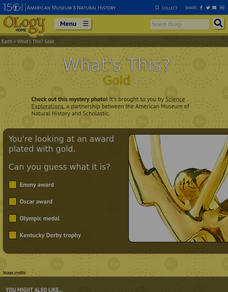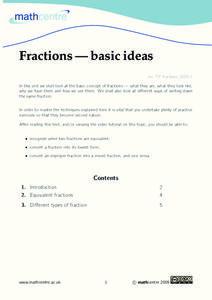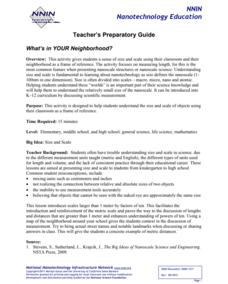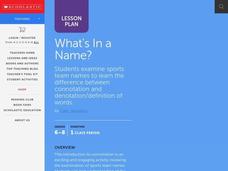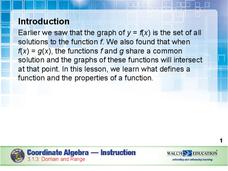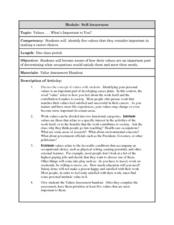Curated OER
Who is Mark Zuckerberg?: Reading Informational Text
This New York Times "Learning Network" exercise provides 10 questions that apply to an article about Mark Zuckerberg. It poses key journalistic questions like, who, what, why, where, how, and when. This resource provides a nice, short...
Curated OER
Is It Ethical to Eat Meat?
Have your class join a blog about whether or not eating meat is good for you. They'll read several passages regarding meat processing and consumption, then they post what they think. There are six critical-thinking prompts to help them...
PEGAMES.org
What Am I?
Looking for a fun transition activity or game to play at the end of the day? Try a game that is very similar to charades but instead, every class member can play at once as performers! The activity also involves movement as a...
K-3 Teacher Resources
Today is a Gift - Children's Quote
Emphasize the importance of today with a brightly colored classroom poster. Kids can use the message to move away from their past and focus on what they can do today. The resource main page includes activities for quote books and other...
American Chemical Society
Exploring Energy
When asked to list everyday objects that require energy, most people list technology that use batteries or electricity. Through hands-on exploration, young scientists discover energy is much more than just circuitry. They play with...
Council for Economic Education
Employment Data: Is the Economy Healthy?
Low unemployment is an indicator of a healthy economy—right? Current employment data and research leads scholars on a quest to find the true health of the economy. They analyze research on Payroll Employment Data and watch a short video...
American Museum of Natural History
What's This? Breathing
Crazy fact: Some animals can survive months without oxygen. An online resource describes some unique ways animals collect oxygen and even live without it for an extended time. Learners read about these special animals and use pop-up...
American Museum of Natural History
What's This? Sensing
There is a scallop that relies on sight so much that it actually has more than 100 eyes! There are many species that rely heavily on one sense or another. An online interactive resource has youth read about several of these animals. The...
American Museum of Natural History
What's This? Gold
Cell phones are likely made of gold—at least part of them! An interesting lesson explains the conventional and not-so-conventional uses of the popular element gold. From the Inca empire to modern-day technology, learners discover gold...
Curated OER
The First Amendment: What's Fair in a Free Country
Students describe the contents of the First Amendment while telling about an example of speech that is protected by the Constitution and that which is not. They attempt to apply the First Amendment to situations that could occur in their...
California Academy of Science
What Would Happen?
Nothing says classroom fun like an invertebrate and a magnifying glass! Snails, earthworms, and roly-poly bugs become the center of attention as pint-sized investigators hone their inquiry and observation skills. They are...
Math Centre UK
Fractions—Basic Ideas
What are fractions? Find out using a reference page and video that goes in depth on how to make fractions equivalent, write fractions in simplest form, convert improper fractions into mixed numbers, and vice versa. Following...
K5 Learning
The Whistle
Get a quick peek into the life of Benjamin Franklin with a resource with a comprehension worksheet that asks learners to read a short tale, respond to a series of questions based on the passage, and then to identify the moral...
National Nanotechnology Infrastructure Network
What’s In Your Neighborhood?
Chart your way to an understanding of nanoscale. Using a Google map, learners estimate a radius around their location of 1,000 and 1,000,000 meters. Predicting what 1,000,000,000 meters would look like takes them off the charts!...
Curated OER
What Portraits Reveal
Students examine how portraits can tell us more about people of the past than just what they looked like. They compare three portraits of U.S. Presidents, analyze portraits of Americans from the Revolutionary War, and write a report on...
Curated OER
What's In a Name?
Introduce your language arts class to connotation, denotation, and diction. Middle schoolers identify and differentiate between the connotative and denotative meanings of words by analyzing the fictitious sports team names....
Curated OER
Domain and Range
Relations, and functions, and line tests, oh my! An instructional slideshow demonstrates the definitions of a relation, a function, and the domain and range of a relation. Viewers then learn how to use mappings and vertical...
American Museum of Natural History
What do you Know About Climate Change?
Test the class's knowledge of the key components of climate change. A 10-question online quiz asks learners about weather, climate, greenhouse gases, and several other concepts related to climate change. Interactive and easy for...
American Museum of Natural History
What's This? Reproduction
Attracting the right mate is as important for humans as any other species. An interesting lesson teaches individuals about several strategies that animals and plants have adapted to attract their mates. From colorful nests to powerful...
Curated OER
What Was Columbus Thinking?
Why is Christopher Columbus one of the most studied figures in history? Upper graders will investigate why Christopher Columbus traveled to the New World and what happened to the native people he encountered. They read and discuss...
Curated OER
Values...What's Important to You?
As your scholars begin their career study, it's important they understand their personal intrinsic values. What makes them feel rewarded? There are discussion prompts here to get learners thinking about specific careers, and they also...
National Endowment for the Humanities
Revolution '67, Lesson 2: What Happened in July 1967? How Do We Know?
Even in a world in which dozens of participants and curious onlookers record every controversial event, the basic facts of what happened are often in dispute. Revolution '67, Lesson 2 explores 1967 Newark, New Jersey using an examination...
Perkins School for the Blind
What Do I Hear?
Being able to give positive reinforcers to a child starts with knowing what the child likes. Intended for children with blindness, this lesson gives you a way to determine the types of music your learners like best. You are given a...
Curated OER
What Kind of Vessel Are You?
This is a strange question; but what kind of vessel would you be and why? After examining images of a large Inca jug, the class sets to writing a creative narrative that answers that very interesting question. They start by researching...
Other popular searches
- What Is Inauguration
- What Is an Autobiography
- What Is Veterans Day
- What Is Democracy
- What Is Science
- What Is Gravity
- What Is Algebraic Expression
- What Is a Memoir
- What Is Culture
- What Is Anthropology
- What Is Contemporary Music
- What Is Home Economics
